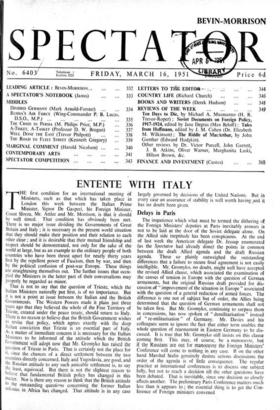ENTENTE WITH ITALY
HE first condition for an international meeting of Ministers, such as that which has taken place in London this week between the Italian Prime Minister, Signor De Gasped, his Foreign Minister. Count Sforza, Mr. Attlee and Mr. Morrison, is that it should be well timed. That -condition has obviously been met. There is no major issue dividing the Governments of Great Britain and Italy ; it is necessary in the present world situation that they should make their position and their relation to each other clear ; and it is desirable that their mutual friendship and respect should be demonstrated, not only for the sake of the world at large, but as an example to the ordinary people of both countries who have been thrust apart for nearly thirty years first by the repellent power of Fascism, then by war, and then by the political confusion of post-war Europe. These things are straightening themselves out. The further issues that occu- pied the Ministers in the latter part of their conversations may properly be regarded as minor. That is not to say that the question of Trieste, which the Italian Ministers naturally put first, is of no importance. But It is not a point at issue between the Italian and the British Governments. The Western Powers made it plain just three years ago that they believed the whole of the Free Territory of T. rieste, created under the peace treaty, should return to Italy. There is no reason to believe that the British Government wishes to revise that policy, which agrees exactly with the deep Italian conviction that Trieste is an essential part of Italy. As a matter of immediate concern it is necessary for the Italian Ministers to be informed of the attitude which the British Government will adopt now that Mr. Gromyko has raised the question of Trieste in Paris. That is certainly not the place for It, since the chances of a direct settlement between the two counttres directly concerned, Italy and Yugoslavia, are good, and the Russian attitude to any such amicable settlement is. to say the least, equivocal. But there is not the slightest reason to believe that fundamental British policy has changed in this matter. Nor is there any reason to think that the British attitude to the outstanding questions concerning the former Italian colonies in Africa has changed. That attitude is in any case largely governed by decisions of the United Nations. But in every case an assurance of stability is well worth having and it has no doubt been given.










































